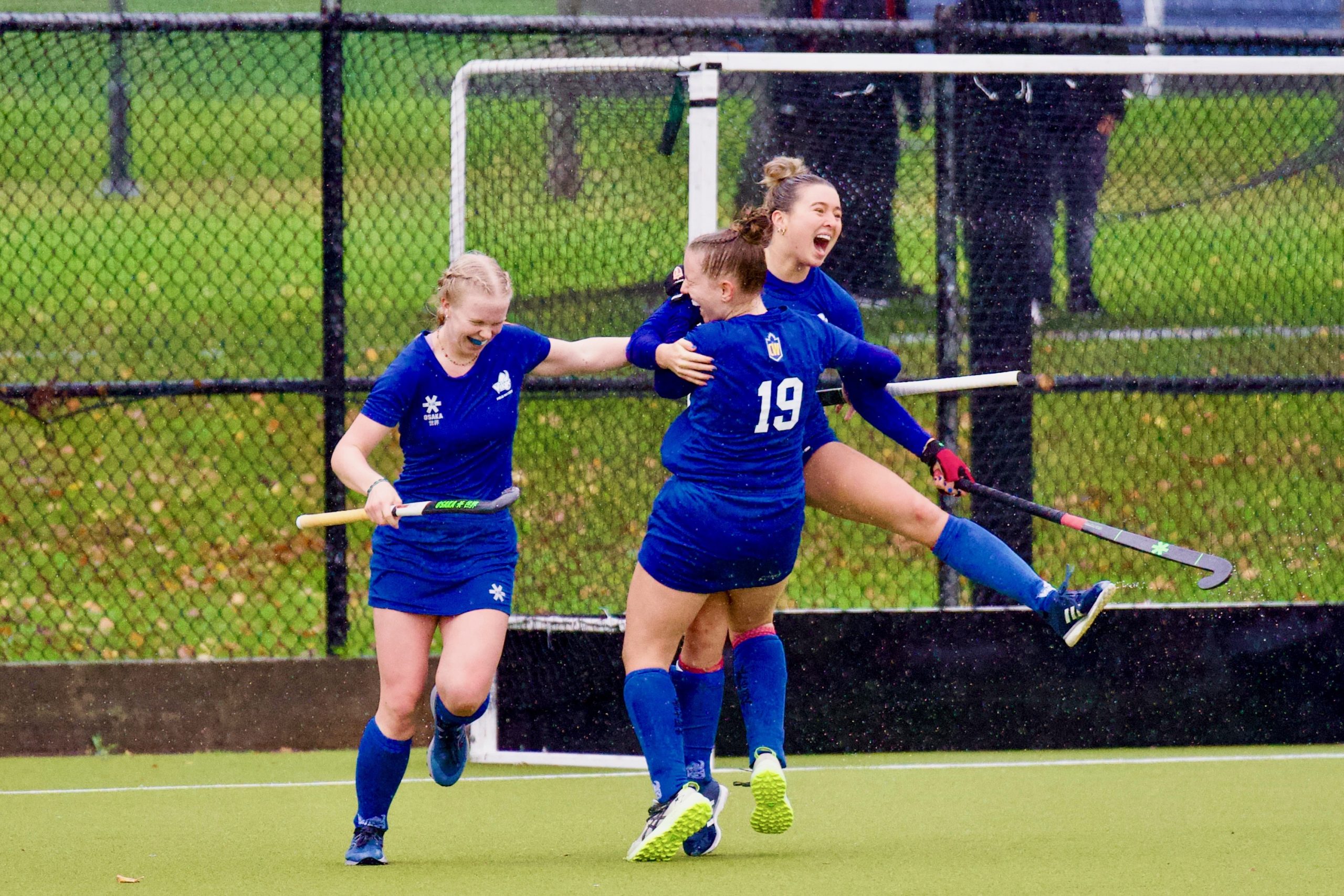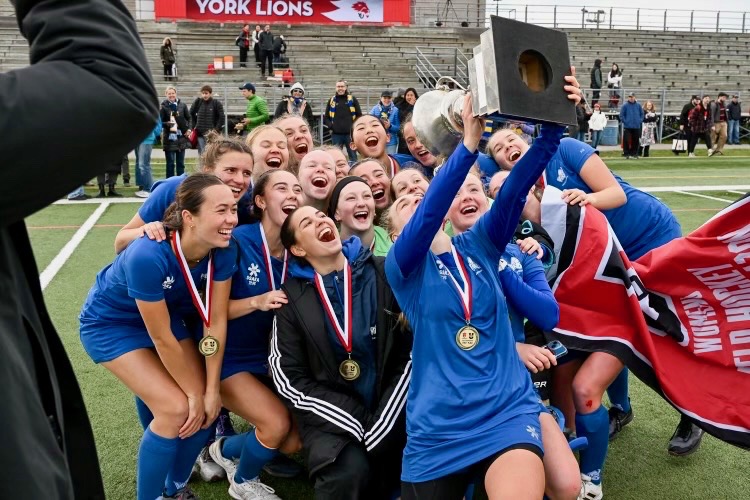Vancouver Island-born players are bringing home titles at a historic rate

Photo courtesy of Krista Thompson.
Two.
That’s the number of goals the Vikes women’s field hockey team allowed over the entirety of the 2024 season, en route to the program’s sixth straight U Sports national championship title.
It was fitting then, that defender Anni Kleinschmidt made the final play of the gold medal game on Nov. 3, deftly intercepting an aerial pass — York University’s last-ditch effort to break through the Vikes’ defensive line — securing a 1-0 win, and continuing the team’s national championship streak.
The Vikes erupted in celebration; field hockey sticks flew into the air, and all 17 players sprinted toward Duncan-born goalkeeper Anais Chace, who didn’t allow a single goal against in four games at nationals.
Fourth-year defender and co-captain Libby Hogg, who now has four national titles with the Vikes, said her initial feeling following the final buzzer was relief.
“It was like, okay, all our hard work that we put in this year is a success, again,” said Hogg.
The Vikes felt some pressure to continue the national win streak and “uphold the legacy,” said second-year forward Amanda Adams, who provided critical scoring at nationals with three goals in the tournament.
UVic’s run of six consecutive national titles began in 2018 (excluding the COVID-19-impacted 2020 season), after nine seasons without a title.
However, a big reason for the program’s success, which now includes 17 national titles since 1975 — second only to UBC’s 19 — can be traced even further back than that.
In 2003, current head coach Krista Thompson, who was the program’s assistant coach at the time, started the Rising Stars program, which allowed the Vikes to offer scholarships to future Vikes women’s field hockey athletes.
The concept was simple: provide a weekly field hockey training session for girls aged 8-18, divided into two groups from fall to spring, and the registration costs for the sessions would go towards field hockey scholarships. The program grew each year, and the revenue it generated helped the team incentivize potential recruits.
In 2018, the dividends of Rising Stars truly took shape. That year, the Vikes graduated five players from the Rising Stars program to their varsity team — all of whom had already spent ten years of development with Thompson and the program, tracing back to when they were eight years old.
That season, the team won a national championship, breaking their nine-year drought — and they haven’t relinquished the trophy since.
“That’s when we started to win,” said Thompson. “It’s one of the pillars of our program, I would say.”

Photo courtesy of Krista Thompson.
The success of Rising Stars has allowed the Vikes to primarily construct their recent rosters from local, island-grown talent — without impacting the program’s ability to be competitive. In fact, the local athletes that the program helped develop have been integral to the team’s current run of six consecutive national titles — a feat only outmatched in U Sports field hockey history by UBC, when Canada’s national senior field hockey team was centralized at UBC and made up much of the Thunderbirds roster.
This season, 16 of the 23 players on the Vikes’ roster are from Vancouver Island, and 15 of 16 came through Rising Stars.
Hogg — who has been selected as a U Sports All Canadian the past two seasons — entered the Rising Stars program when she was eight years old.
“My mom just signed me up one day,” said Hogg, who now, along with other Vikes field hockey players, helps coach the Rising Stars program throughout the season.
“It’s cool to come full circle and be coaching it, because I remember when I was in the program and looking up to the coaches that came and helped us,” added Hogg.
Several Rising Stars and Vikes alumni have also had opportunities to play and train with Field Hockey Canada teams at both junior and senior levels, including Hogg, who now also trains with the national team, with a goal to make the senior roster for the upcoming Nations Cup in February.
Hogg is part of another initiative which co-aligns with the Vikes’ current six-year run of dominance. In 2018, coaches Lynne “Buzz” Beecroft and Krista Thompson shifted the team’s co-captain structure to a “leadership group,” made up of four captains with representation from each year of athletes.
“Each captain is responsible for their year,” said Thompson. “This year we have a second year, third year, fourth year, and fifth year [in] the leadership group … I lean on the athletes a lot in terms of what’s going on [with the players] and what their needs are … they’re a generation who want to be involved and add value.”
Hogg has been part of the leadership group since her first year with the Vikes, and said the structure helps ease communication and decision-making throughout the team.
“You always have a safe person on your team that you’re able to talk to,” added second-year forward Adams. “I think [the leadership group] is really good to have.”
Adams also attributed the team’s on-field success to how close the players are off of the field. “Every weekend we’re hanging out…. It’s probably the closest team I’ve ever been on.”
Similarly, when asked about nationals in November where the team spent a week in Toronto, fifth-year player Anni Kleinschmidt spoke first about times with her teammates, before commenting on the games themselves.
“Weirdly, we picked up crafting a lot this year, [and had] movie nights. I don’t know, the vibes were just good,” recalled Kleinschmidt. “The time that I spent with my teammates was the most fun. Obviously, the games are what we’re there for and we want to play, but for me personally, the most important thing is my teammates.”
“They all really care about one another,” added Beecroft, who began a yearly tradition in the mid 2000s of taking the team to Boston, and sometimes New York, to play Ivy League Division 1 universities in late August after training camp.
Beecroft intended for the trip to serve both as an opportunity to play against elevated competition before the U Sports season begins, as well as time for players to get to know one another.
“It’s as much a team-bonding opportunity off the field as it is on the field. That’s our thought process,” said Beecroft.
In recent years, the players have been given time to explore the city, attend a Boston Red Sox baseball game, and, according to Hogg, they always eat dinner at the same Asian fusion restaurant, Li’s.
“[Coaches] ‘Buzz’ and Krista love this place … I think we had three or four dinners there, and that was the same last year,” Hogg said, laughing.
During down time at the hotel, Kleinschmidt said some players organized sketches to perform for the team. On this year’s trip, Kleinschmidt and a few others performed a synchronized swimming routine in the hotel pool.
“It’s just to make people laugh,” she said. “Everybody’s super comfortable with each other … and the sketches are really silly.”

Photo courtesy of Krista Thompson.
On the field during the Boston trip, the team tied Dartmouth College after leading most of the game, and lost 3-1 to Harvard, the seventh-ranked team in the United States. The Vikes were also scheduled to play a game against Yale, but it was cancelled due to weather.
Back in Canada, the Vikes began their 2024 season with consecutive 6-0 wins against the University of Calgary, before running into a UBC team who almost ended the Vikes’ season early. After two ties and a 0-1 loss to UBC over the course of the season, the Vikes needed to beat the Thunderbirds at UBC to secure the Canada West Championships and qualify for nationals.
Coach Thompson’s message going into a game with such high stakes was to “pretend like it’s just a big playdate, and have fun out there,” Hogg recalled. “Everyone went in with the mindset of, ‘this could be our last game,’ so just leave it all out there.”
The game was deadlocked at zero until Kleinschmidt stepped up for a penalty stroke with twelve minutes remaining and delivered a well-placed shot in the pouring rain past the sprawling UBC goalkeeper. The Vikes went on to win 3-0, and for the sixth year in a row, ended UBC’s season and nationals aspirations.
“Yeah, I think they very much don’t like us. But, not my problem anymore,” joked Kleinschmidt, who’s now in her final year at UVic.
With a berth to nationals once again secure, the Vikes enjoyed their last practice on Oct. 31 before leaving for Toronto — which, of course, was “costume mandatory.”
Anni Kleinschmidt, whose nickname on the team is “Anni-Bananni” or “Banan,” practiced in a big, floppy banana suit. Ten players dressed up as the Thumbs from the movie Spy Kids, and a few of the rookies showed up as Teenage Mutant Ninja Turtles (likely an easier costume to practice in).
This year’s Halloween costume practice wasn’t the first, said former head coach Beecroft, who is now in a mentor-coach role after spending 39 years in her former role, shaping the program into what it is today.
“If the athletes are having fun, they’re more apt to try new things and be successful,” said Beecroft, who admits that while she may not have been the “best tactician,” she always prioritized a positive, encouraging environment.
“I think you only ever grow if you allow yourself to make mistakes, and I am somebody who allows that to happen … because that’s an opportunity to learn,” she said.
At nationals, the Vikes were met with a new challenge: playing on York University’s rubber base turf instead of the water-based turf they play and practice on at UVic, which lubricates the pitch, reducing friction and allowing for smoother play.
“What you couldn’t do there that is easy on our surface is dribble or carry the ball, because it would get stuck more [easily] in the fibers,” explained Thompson.
The turf frustrated the Vikes players in the first and second game of the tournament, said forward Adams, but the team was able to adjust by the third game, cruising to a 3-0 win over York on Saturday, Nov. 2, before facing the host team once again the following day in the gold medal match.
“It was obviously harder on Sunday. I think there’s more nerves, there’s anxiousness,” said Thompson.
Before the players went onto the field for the final game, Thompson played a video in the locker room of Vikes field hockey alumni wishing the team well.
“It definitely brought tears to some people’s eyes,” said Adams. “Like, even when you graduate from this program, you’re still always a part of the team.”







